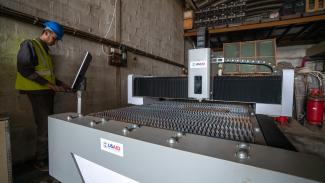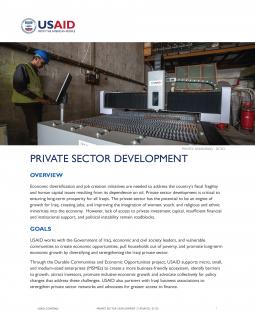USAID works with the Government of Iraq, economic and civil society leaders, and vulnerable communities to create economic opportunities, pull households out of poverty, and promote long-term economic growth by diversifying and strengthening the Iraqi private sector.
Overview
Economic diversification and job creation initiatives are needed to address the country's fiscal fragility and human capital issues resulting from its dependence on oil. Private sector development is critical to ensuring long-term prosperity for all Iraqis. The private sector has the potential to be an engine of growth for Iraq, creating jobs, and improving the integration of women, youth, and religious and ethnic minorities into the economy. However, lack of access to private investment capital, insufficient financial and institutional support, and political instability remain roadblocks.
Goals
Through the Durable Communities and Economic Opportunities project, USAID is supporting micro, small, and medium-sized enterprises (MSMEs) to create a more business-friendly ecosystem, identify barriers to growth, attract investors, promote inclusive economic growth and advocate collectively for policy changes that address these challenges. USAID also partners with Iraqi business associations to strengthen private sector networks and advocates for greater access to finance.
The Funding Facility for Economic Reform supports the Federal Government of Iraq and the Kurdistan Regional Government’s efforts to implement economic reforms that respond to citizens’ demands for more responsive public financial administration, market diversity, and improved integrity and transparency.
USAID’s Iraqi Governance and Performance Accountability project provides individualized business development services to SMEs to boost their access to different markets, attract investment opportunities, and enhance their business skills. A special emphasis is on women, youth, and marginalized group lead businesses.
The USAID-funded Middle East and North Africa Investment Initiative (MENA II) supports businesses in Iraq with access to capital investment and business development services to improve firm-level competitiveness, grow their revenue, and create jobs. USAID, through MENA II, will invest $2 million in small and medium-sized agribusinesses to increase food security in Iraq.
USAID, along with other donors, is supporting the return of internally displaced populations in Ninewa through the Enterprise Development Fund that promotes inclusive economic recovery and private sector revitalization by providing small grants to SMEs.
Through the New Partnerships Initiative, USAID supports the Iraqi firm Top Mountain to improve production and business operations, public private cooperation, and increasing demand for agriculture products. The program’s goal is to increase the competitiveness of Iraqi agriculture products and promote consumption and use of local products.
The USAID-funded Water & Energy for Food Grand Challenge supports Iraqi innovators offering solutions to increase food production and boost the economy while ensuring sustainable water and energy use.
Key Results
- Since 2020, over 10,000 entrepreneurs have received business support services from USAID programs, including assistance for setting up, formalizing, and sustainably scaling their businesses. About 50% of the entrepreneurs are women.
- Since 2019, USAID provided about 3,000 business grants and loans, creating thousands of jobs, and achieving over 65% increase in businesses revenues. About 7,500 youth also received business development services.
- USAID established the first MSMEs database at the Federal and Kurdistan Regional Government’s Ministry of Planning to create a roadmap for formalizing and empowering Iraq’s private sector.
Providing Access to Finance:
- Offered over $30 million in direct loans and grants to expand small and medium enterprises' capital, leading to an estimated 80% increase in business revenue. Of this amount over $1.5M went into loans to support businesses recover from COVID impact.
- Attracted over $41 million in private investments to expand local businesses in technology, trade, and the industrial sector.
- Created the first informal coordination platform, in coordination with the donors’ community and financial institutions, to address access to finance issues, offering new funding opportunities to SMEs.

USAID Iraq, DCEO.

